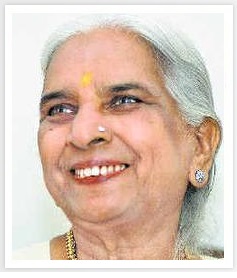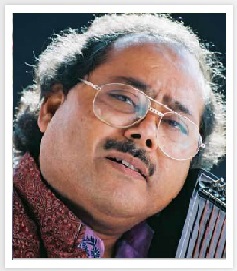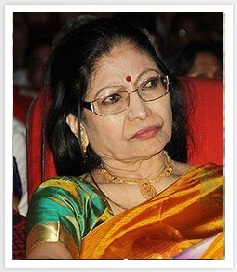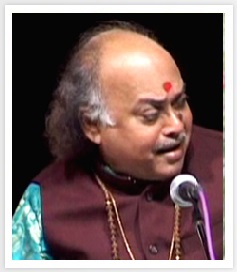





Padmabhushan Vidushi Girija Devi
The Queen of Thruri and the living legend of Indian Musical heritage and a Padmabhushan awardee Vidushi Girija Devi was born in Varanasi, on May 8 1929 to Ramdeo Rai, a Bhumihar Brahmin zamindar. Her father played the harmonium and taught music, and had Devi take lessons in singing khyal and tappa from vocalist and sarangi player Pandit Sarju Prasad Misra starting at the age of five. She starred in the movie Yaad rahe aged nine and continued her studies under Pandit Chand Misra in a variety of styles.
Girija Devji also lovingly known as Appaji has helped evevate the status of the purabi ang style of music which includes the semi-classical genres of Thumri, Dadra, Kajri, Chaiti, Jhoola Hori and Tappa. Being equally adept in Beneras Gharana style of Khayal inchuding Dhrupad and Dhamar, Appaji has spread Indian music through performance and teaching and ehas a big cintribution in preserving the valuable Indian Musical Heritage.
Padmaja was accepted and blessed by Girija Deviji during 2012 and had been training her in the purbi ang style of Thumri. Though Padmaja never had any exposure in this genre, it was the Guru in Appaji which brough out the hidden talent in this style of Music in a very short period of time. Appaji's approach towards life and Music has been a path finder for Padmaja.

Pandit Samaresh Chawdhury
Pandit Samaresh Chawdhury son and disciple of the illustrious Sangeet Acharya Amaresh Chandra Chawdhury was born on 8th September 1955. Samareshji later sharpened his rare skills under the able guidance of the great maestro Bharat Ratna Pandit Ravi Shankarji since 1984. He is a rare combination of a brilliant performer and a highly sought after Guru
Gifted with a mellifluous and resonant voice he has a rare and enviable command over his medium of expression. His detailed and flawless manner of bringing out the rare nuances of ragas in the “Vistar” and “Barhat” portion with glimpses of Dhrupad gayaki which he has mastered at a very young age during the talim under his illustrious father. This exquisite swargams and tans with wonderful mix of “tantrikari” (instrumental style) adopted from Pandit Ravi Shankar punctuated with meticulous “tehais” give an insight of his vigorous training
Initial training in Dhrupad and Khayal from his father Sangeet Acharya Amaresh Chandra Chawdhury a disciple of Ustad Dabir Khan Saheb who was the nephew of Ustad Wazir Khan Saheb, a direct descendant of Mian Tansen who established the Senia Gharana.
Advanced training under Pt. Ravi Shankar a disciple of Ustad Allauddin Khan Saheb who trained under Ustad Wazir Khan Saheb of Senia Rampur Gharana.
Pandit Samaresh Chawdhury accepted Padmaja as his disciple during 2012 and has been imparting advance training in Gayeki and in-depth knowledge of Ragas. Having a vast in-depth knowledge of Ragas with intecracy and minute details,Pt. Samarashji also has expectional teaching capabilities apart from his welknow performance skills. The richness of Ragas that Pandit Samareshji has bestowed on Padmaja has been widely appreciated by a both the music lovers/ critics and the media during her performances.

Padmashree Vidushi Sumitra Guha
Noted Padmashree awardee Vidushi Sumitra Guha nee Raju was born in an Andhra family and music came naturally to her from her mother Smt.Rajyalakshmi Raju. Being born in an age when women were not to wish but to execute, Smt.Rajyalakshmi endowed her eldest daughter with what she had best, her voice. Initiated naturally to the Carnatic form of music, she received strong grounding under the tutelage of Sangeeta Vidwan S.r.Janakiraman.
Her admission to Tagore's Visva Bharati opened up new horizons and she was drawn to the Hindustani style. Coming to Calcutta at a tender age following her marriage into a Bengali family held great meaning, since it marked the start of her journey into the newfound world of Hindustani classical vocal music. Guiding her steps in this endeavour were the great Pandit A.Kanan and Vidushi Malobika Kanan, The depth of the alaap, the slow elaboration of notes in the vistaar and the stability of swaras now became her style and she became on the of the Kirana gharana. She also took guidance from Pt.Sushil Kumar Bose, a well-known disciple of Ustad Bade Ghulam Ali Khan. From stone to stone she stepped and since 1995 has been a top grade vocalist of All Indian Radio.
Vidushi Sumitra Guhaji also loving called Didi by her disciples was indeed the teacher who was instrumental and an inspiration in Padmajs's life by encouraging and polishing her talents hence transforming her in a performer. Since her arraival in Delhi during 1999 Sumitraji has been guiding her and given her a distinct flavour in her performances including Khyal and Bhajan. Padmaja excelled under her tutilage andhas also accompanied her to may of her concerts in India and abroad both as a support singer and an accompanying artist playing Harmonium.

Pandit Dinanath Mishra
Pandit Dinanath Mishra currently based in Kolkata was born in 1943 in Azamgarh U.P. He comes from a family where music is a way of life . At the age of five he was , first exposed to musical training by his mother. After that , his formal training began under the strict and loving discipline of his father & Guru Pandit Rakhal Mishra Ji , who was a Torch Bearer of Sangeetacharya Pandit Sukhdeo Maharaj of Banares Gharana
Pandit Dinanath Mishraji had the privilage of coming in contact with the great musical celebrity of the country at Calcutta at the stage. Later , he being influenced by, the style of Sangeetacharya Chinmoy Lahiri of Lucknow for many years in “Khayal” and “Thumri” and emerged as an established artist not only in Kolkat but throughout India with a style , which unmistakably , is his own.
Pandit Dinanath Mishraji accepted Padmaja as his disciple during1989 who had introduced her to the world of Hindustani Classical Music for the first time. Though Padmaja could not continue learning from Panditji for too long due to her marriage and leaving Kolkata, Panditji's gift of music to Padmaja is always prized by Padmaja



